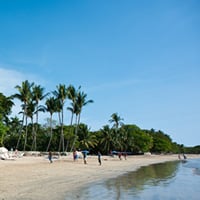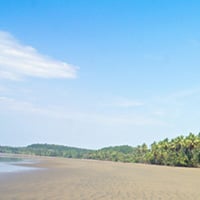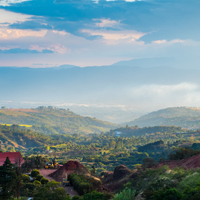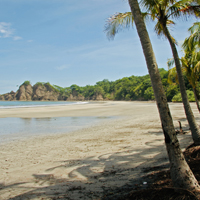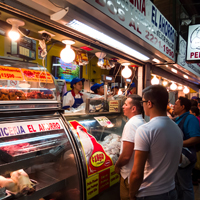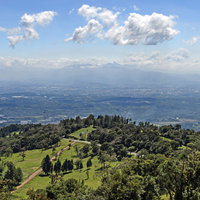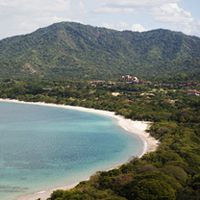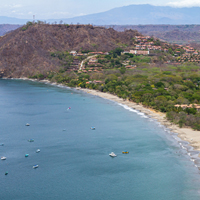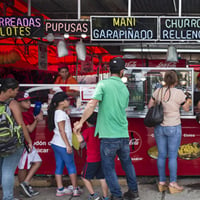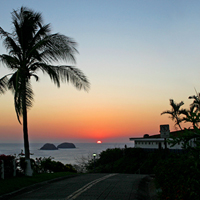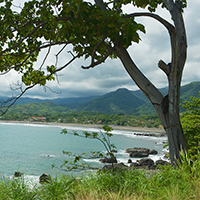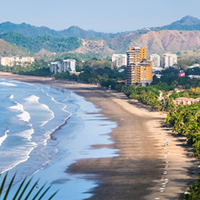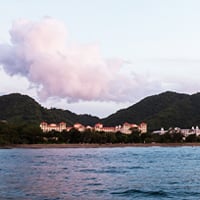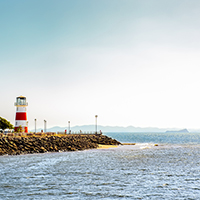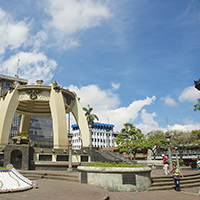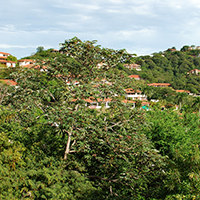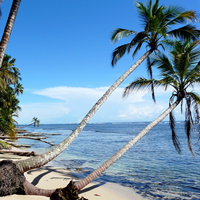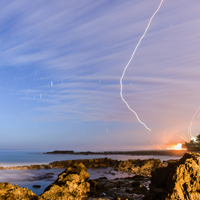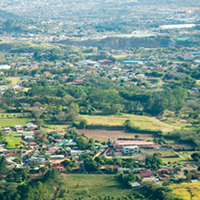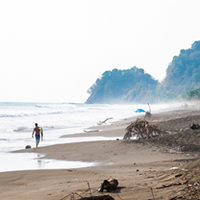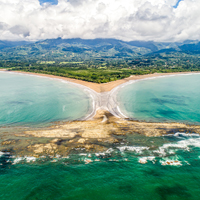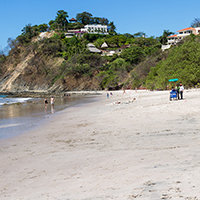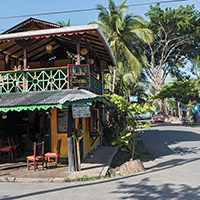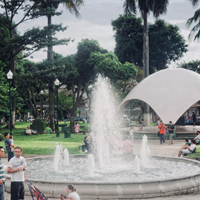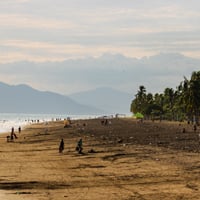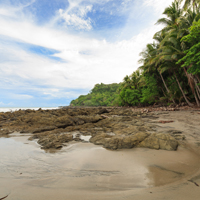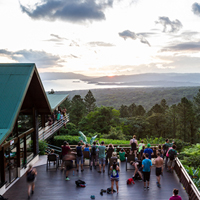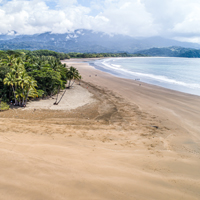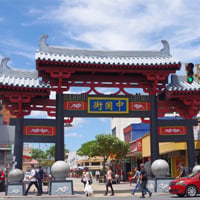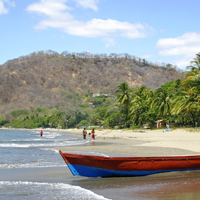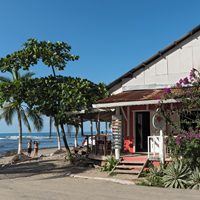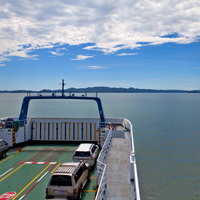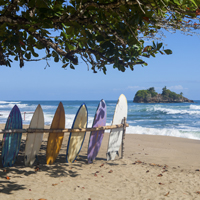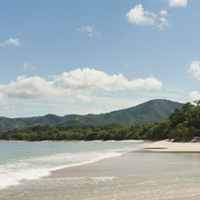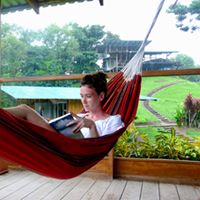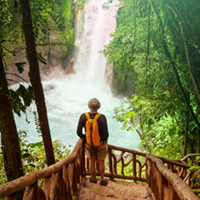Costa Rica
Coastal BeachesCosta Rica is a vibrant Central American country known for its remarkable biodiversity, lush rainforests, and commitment to peace and sustainability. It is bordered by Nicaragua to the north, the Caribbean Sea to the northeast, Panama to the southeast, and the Pacific Ocean to the southwest. The country's landscape is a tapestry of towering mountains, active volcanoes, and rolling plains. Costa Rica's democratic tradition and abolition of its military in 1949 have contributed to its reputation as one of the most stable and prosperous nations in the region. The capital city, San José, is home to cultural institutions like the Pre-Columbian Gold Museum, and it serves as a hub for economic and political activity. The nation's economy is driven by tourism, agriculture, and technology. Ecotourism is particularly significant, with visitors flocking to national parks and protected areas to experience the country's renowned wildlife and natural beauty. Costa Ricans, or Ticos as they call themselves, are known for their friendly demeanor and the national motto "Pura Vida" (pure life), which encapsulates their approach to living life with joy and gratitude. The country's commitment to conservation is evident in its extensive network of national parks and protected areas, which cover more than a quarter of its land area. Costa Rica's education system is also noteworthy, with a high literacy rate and free public education. The cultural landscape is a blend of indigenous, European, African, and Asian influences, resulting in a rich tapestry of traditions, cuisine, and arts. The nation's biodiversity is staggering, with habitats ranging from tropical rainforests and cloud forests to mangroves and coral reefs, supporting a wide array of flora and fauna. This environmental treasure trove makes Costa Rica a prime destination for nature enthusiasts and scientists alike.
 AGS Worldwide Movers
AGS Worldwide MoversGet Quote
Relocating abroad soon? Make your move with AGS! AGS Worldwide Movers is a leader in the international moving industry. Our experience and expertise allows us to guarantee our clients the best quality moving services.
 AGS Worldwide Movers
AGS Worldwide MoversRelocating abroad soon? Make your move with AGS! AGS Worldwide Movers is a leader in the international moving industry. Our experience and expertise allows us to guarantee our clients the best quality moving services.
Get Quote
Living in Costa Rica
Best Places to Live in Costa Rica
Visa & Residency
Obtaining a residency in Costa Rica is a process that can be straightforward if the applicant meets all the requirements and follows the necessary steps. The most common types of residency visas for expats are the Pensionado Visa and the Rentista Visa. To qualify for the Pensionado Visa, applicants must prove a permanent income of at least $1,000 per month from a pension or retirement fund. The Rentista Visa requires a monthly income of $2,500 for at least two years, guaranteed by a banking institution, or a $60,000 deposit in a Costa Rican bank. Another option is the Investor Visa, which requires a minimum investment of $200,000 in a Costa Rican business or real estate. The process involves gathering a list of required documents, such as a birth certificate, police record, proof of income, and marriage certificate if applicable, all of which must be apostilled or authenticated by the Costa Rican consulate. After arriving in Costa Rica, the applicant must join the Caja Costarricense de Seguro Social (CCSS), which is the national healthcare system, and pay the corresponding fees. Applications are submitted to the General Directorate of Migration and Immigration. The process can be lengthy, taking several months to complete, and it is often recommended to hire a local attorney or a specialist to assist with the application to ensure all paperwork is correctly filed and to navigate the bureaucracy. Once approved, the residency is typically granted on a temporary basis, usually for one to three years, and can be renewed. After three years of temporary residency, applicants can apply for permanent residency. The process is considered average in difficulty compared to other countries, but it does require patience and attention to detail. Applicants must remain in Costa Rica for at least four months each year to maintain their residency status. The process is bureaucratic and can be slow, but it is generally manageable with the proper guidance and preparation.
Healthcare in Costa Rica
Costa Rica's healthcare system is recognized as one of the best in Latin America. The country operates a universal healthcare system, Caja Costarricense de Seguro Social (CCSS), which provides comprehensive coverage to citizens and legal residents. Public healthcare is funded by the government through a combination of social security contributions and state funding. The quality of public healthcare is generally good, with a network of hospitals and clinics spread throughout the country, although facilities may be more limited in rural areas compared to urban centers. Private healthcare is also available and is often used by those who prefer shorter wait times and more luxurious accommodations. Private healthcare costs can be high, but still generally lower than in the United States. Expats and digital nomads who become legal residents can join the CCSS by paying a monthly fee based on income, which then grants them access to public healthcare. Some expats also choose to purchase private health insurance or pay out-of-pocket for private medical services.
Cost of Living
The cost of living in Costa Rica is considered moderate compared to North American and European standards, although it can be higher than in other Central American countries. Expenses such as housing, healthcare, and transportation are generally affordable, but imported goods and services can be relatively expensive.
Weather
Costa Rica has a tropical climate with two distinct seasons: the dry season, which is from December to April, and the rainy season, which is from May to November. The country's diverse geography results in a range of microclimates, with cooler temperatures in the highlands and warmer, humid conditions along the coasts. Rainfall can be heavy, especially in the rainforest areas, but the country is known for its lush greenery and abundant wildlife.
Educational System in Costa Rica
Costa Rica's educational system is highly regarded in Latin America, with a strong emphasis on providing free and compulsory education to its citizens. Education in Costa Rica is overseen by the Ministry of Public Education, which ensures that all children have access to primary and secondary education. The system is divided into four main levels: preschool (educación preescolar), primary school (educación primaria or escuela), secondary school (educación secundaria or colegio), and higher education (educación superior). Preschool education starts at the age of four, and primary education begins at the age of six, lasting for six years. Secondary education is divided into two cycles: the first three years are general education, and the final three years are diversified, allowing students to specialize in academic or technical studies. The school year in Costa Rica typically runs from February to December. Students graduate from secondary school around the age of 17 or 18, after which they can choose to pursue higher education. The Costa Rican government invests a significant portion of its budget in education, and as a result, the country boasts a high literacy rate. Schools in Costa Rica are known for their bilingual education programs, particularly in Spanish and English, which is beneficial for expatriate families. Additionally, there are several private and international schools that offer curricula from other countries, such as the United States or the International Baccalaureate, which can be appealing to families moving to Costa Rica from abroad.
Copyright 1997-2025 Burlingame Interactive, Inc.

